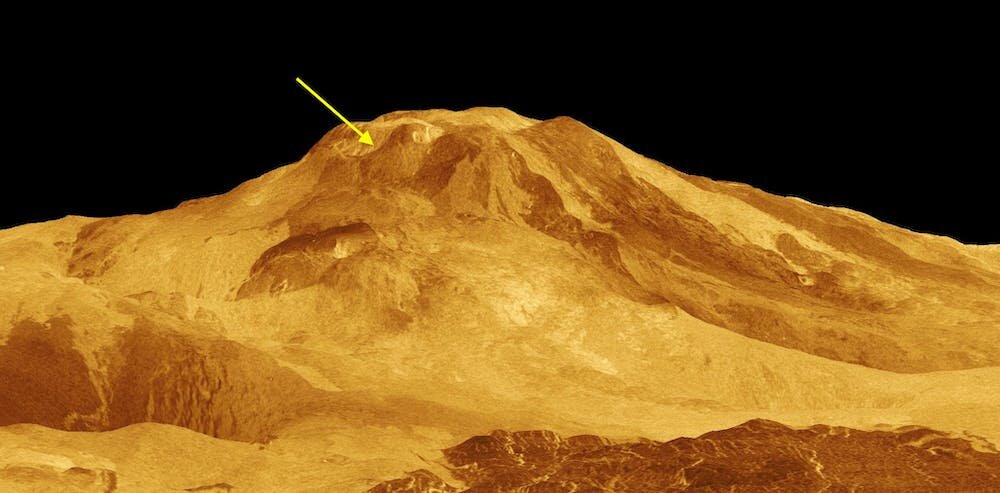First Evidence Of Active Volcanoes Found On Venus
First evidence of active volcanoes found on Venus, a planet similar in size, mass, and density to Earth. Finally, geophysicist Robert Herrick of the University of Alaska, Fairbanks, has caught one of Venus's volcanoes in the act, according to a study published in the journal Science and presented at the Lunar & Planetary Science Conference in Houston.
Author:Karan EmeryReviewer:Daniel JamesMar 19, 202383K Shares1.4M Views

First evidence of active volcanoes found on Venus, a planet similar in size, mass, and density to Earth. Finally, geophysicist Robert Herrick of the University of Alaska, Fairbanks, has caught one of Venus's volcanoes in the act, according to a study published in the journal Science and presented at the Lunar & Planetary Science Conference in Houston.
The challenge in studying Venus's surface lies in its dense atmosphere, which includes an opaque cloud layer at a height of 45-65km that blocks most radiation wavelengths, including visible light. The only way to get a clear view of the surface is by using radar from an orbiting spacecraft directed downwards, using a technique known as aperture synthesis to construct an image.
NASA's Magellan probe used this method to map Venus's surface between 1990 and 1994, revealing that over 80% of the surface is covered by lava flows. However, whether any eruptions continue today and the age of the youngest flows remained a mystery for three decades.
Hints of activity were observed through spacecraft peering into, and sometimes through, the clouds, suggesting the presence of freshly erupted lava. Thermal anomalies that could correspond to active lava flows and temporary local spikes in atmospheric sulfur dioxide concentration were also detected, but none provided clear evidence of ongoing eruptions.
The new study now provides the first evidence of active volcanoes on Venus. By comparing radar images taken at different times, the researchers found a volcanic vent on Maat Mons, one of Venus's largest volcanoes, that doubled in size between February and October 1991.
The vent also became shallower, indicating that it partially collapsed and was filled by fresh lava during October. The changes observed in the images could not have resulted from variations in surface slope or direction.
Most planetary scientists already suspected Venus to be volcanically active, and attention will now shift to how frequently and where eruptions occur on the planet. The discovery will be of particular interest to NASA's Veritas and ESA's EnVision missions, both approved in 2021, which will carry better imaging radar than Magellan. EnVision is set to reach Venus's orbit in 2034.
NASA's DaVinci mission, which is expected to provide optical images during its descent, is likely to arrive ahead of Veritas and EnVision, promising an exciting time for planetary exploration in the coming years.
Conclusion
These upcoming missions are likely to uncover more exciting discoveries about Venus and its geology. The recent discovery of active volcanoes on the planet has only added to the growing body of evidence that Venus is a more complex and dynamic planet than previously thought.
Jump to

Karan Emery
Author
Karan Emery, an accomplished researcher and leader in health sciences, biotechnology, and pharmaceuticals, brings over two decades of experience to the table. Holding a Ph.D. in Pharmaceutical Sciences from Stanford University, Karan's credentials underscore her authority in the field.
With a track record of groundbreaking research and numerous peer-reviewed publications in prestigious journals, Karan's expertise is widely recognized in the scientific community.
Her writing style is characterized by its clarity and meticulous attention to detail, making complex scientific concepts accessible to a broad audience. Apart from her professional endeavors, Karan enjoys cooking, learning about different cultures and languages, watching documentaries, and visiting historical landmarks.
Committed to advancing knowledge and improving health outcomes, Karan Emery continues to make significant contributions to the fields of health, biotechnology, and pharmaceuticals.

Daniel James
Reviewer
Daniel James is a distinguished gerontologist, author, and professional coach known for his expertise in health and aging.
With degrees from Georgia Tech and UCLA, including a diploma in gerontology from the University of Boston, Daniel brings over 15 years of experience to his work.
His credentials also include a Professional Coaching Certification, enhancing his credibility in personal development and well-being.
In his free time, Daniel is an avid runner and tennis player, passionate about fitness, wellness, and staying active.
His commitment to improving lives through health education and coaching reflects his passion and dedication in both professional and personal endeavors.
Latest Articles
Popular Articles